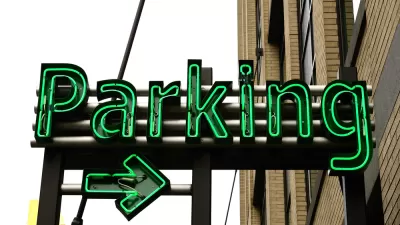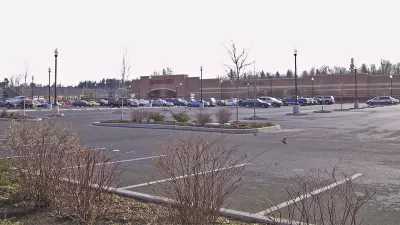Parking Minimums

A Primer on Innovative Parking Regulations
Writing for Smart Growth America, Neha Bhatt provides a survey of innovative parking regulation and management strategies in cities around the country.
More Disincentives for Driving Required for Philadelphia to Achieve 'Greenest' Status
Philadelphia's Mayor Michael Nutter has set a policy goal of becoming the "Greenest City in America," but the city's lack of progress in reducing automobile use is a troubling obstacle to such a lofty goal.
Six Years Later—More Revisions for Washington D.C.'s Zoning Code Update
None of the original team that began working on Washington D.C.'s zoning code update are still working on the project. Much has changed in the six years that have expired.
Vancouver Could Remove Parking Minimums for Condo Developments
Vancouver’s Transportation 2040 plan allowed for the easing of parking minimums for residential developments in parts of the city, and now city planners are beginning to explore where and how condos can be built without parking.

Exposing Black Friday's Parking Perversion
Parking lots across the U.S. are designed to accommodate the crowds of cars participating in the busiest shopping day of the year. By asking his readers to capture images of underutilized lots last Friday, Chuck Marohn set out to expose the fallacy.
Cincinnati Revival Gets Boost With Parking Requirement Reform
Recognizing the obstacle to redevelopment and livability presented by its outdated parking requirements, Cincinnati leaders have reduced parking minimums in the central business district and historic Over-the-Rhine neighborhood, reports Randy Simes.
Redesigning American Cities for Less Driving
This 16-minute radio interview of Forbes writer Micheline Maynard and Cornell urban planning professor Michael Manville explores how and why to redesign cities to make them less auto-dependent to match reduced driving.
Unlocking the Curb Conundrum: How to Solve Our Parking Crisis
For Alan Durning, curb-parking territoriality is the root cause of many of America's urban ills, from housing affordability to economic vitality. He describes the circumstances that've led to the current state of affairs and introduces the way out.
D.C. Backtracks on Parking Reform
Opponents to a proposal to eliminate parking minimums in certain areas of D.C. have been heard. In order to smooth approval of the city's massive zoning overhaul, planners will reduce minimums in some areas rather than eliminate them.

From Peak Car to Peak Parking?
Fewer cars on the road, less driving, why not fewer parking spots? Cities like D.C., L.A., Denver, Philadelphia are responding by reducing or eliminating parking minimums, while Portland, which had already eliminated them, are bringing them back.
Effort to Eliminate D.C. Parking Minimums Comes Under Attack
Like many cities across the country revisiting their outdated zoning codes, Washington D.C. has made parking requirement reform a centerpiece of their efforts. These efforts have attracted the ire of residents and AAA who fear parking armageddon.

How Parking Minimums Beget Ugly Urban Environments
In the Pacific Northwest, and elsewhere, excessive parking requirements dictate the form and footprint of buildings, mostly to the detriment of urban environments. In a lavish photo essay, Alyse Nelson explores the damage inflicted by parking laws.
10 Principles for Smart Growth in Existing Communities
Frustrated by what's passing as "smart growth" and "transit oriented development," Bill Adams postulates ten refinements (or less subtly stated clarifications) of the principles of smart growth and new urbanism.
Santa Monica Battles Itself, and Consultants, Over Parking
In this supposed progressive paradise, the recent removal of a transportation consultant reveals the conflicting agendas of residents that want to reduce congestion and those who want to build more parking. Then there are those that want both.
Is Good Transit Necessary for Parking Reform?
Paul Barter answers with an unequivocal no. He outlines the reasons why debates over the elimination of parking minimums should be decoupled from transit, and identifies other reforms that can make parking changes palatable.
Sacramento Relaxes Parking Requirements to Stimulate Development
In what is being described as a "monumental shift" in the city's approach to parking, Sacramento's City Council has voted to ease minimum parking requirements for commercial and residential developments reports Tony Bizjak.
Zurich's Parking Policy Evolution: Cap & Replace
Zurich underwent a major parking policy change for its downtown - from 'predict and provide' (i.e. parking minimums) to 'cap and replace'. When a new parking space is provided, a surface parking space is designated toward public plazas.
In Appreciation of Nashville's Innovative New Downtown Code
Charlie Gardner writes about what can be found in, and more importantly what is excluded from, one of the most progressive code revisions to be adopted by a major American city.
Closing Loopholes in NYC Parking Reforms
New York City already has low parking maximums in place in much of Manhattan, but those maximums are riddled with loopholes. A set of reforms being developed by the Department of City Planning would tighten those regulations further.
Plan to Revitalize Public Housing Stymied by NYC Parking Requirements
New York City Housing Authority Chairman John Rhea says that the city's own parking minimums are making it difficult to make public housing sites more mixed-use, mixed-income and financially sustainable.
Pagination
Urban Design for Planners 1: Software Tools
This six-course series explores essential urban design concepts using open source software and equips planners with the tools they need to participate fully in the urban design process.
Planning for Universal Design
Learn the tools for implementing Universal Design in planning regulations.
Caltrans
Smith Gee Studio
Institute for Housing and Urban Development Studies (IHS)
City of Grandview
Harvard GSD Executive Education
Toledo-Lucas County Plan Commissions
Salt Lake City
NYU Wagner Graduate School of Public Service


































